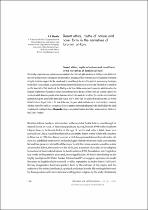| dc.contributor.author | Moolla, Fatima | |
| dc.date.accessioned | 2023-03-07T08:09:03Z | |
| dc.date.available | 2023-03-07T08:09:03Z | |
| dc.date.issued | 2015 | |
| dc.identifier.citation | Moolla, F. (2015). Desert ethics, myths of nature and novel form in the narratives of Ibrahim al-Koni. Tydskrif vir Letterkunde, 52 (2) ,176-196. https://doi.org/10.4314/tvl.v52i2.12 | en_US |
| dc.identifier.issn | 2309-9070 | |
| dc.identifier.uri | https://doi.org/10.4314/tvl.v52i2.12 | |
| dc.identifier.uri | http://hdl.handle.net/10566/8542 | |
| dc.description.abstract | This broadly comparative essay contrasts environmentalism in the fiction in English translation of the Libyan writer, Ibrahim alKoni, with dominant trends in contemporary environmentalism. An analysis of three of the most ecocritically pertinent of the novels in English translation suggests that the natural world is viewed through the lens of the mythical, encompassing the religious worlds of both Tuareg animism, as well as monotheism represented by Islam and early Christianity. The novels to be considered are The Seven Veils of Seth, Anubis and The Bleeding of the Stone. Unlike environmental approaches which derive from the European Enlightenment of procedural rational disenchantment, human beings in Al-Koni’s work are accorded a place in the sacred order which allows non-parasitic modes of existence within the framework of a sacred law. | en_US |
| dc.language.iso | en | en_US |
| dc.publisher | University of Pretoria | en_US |
| dc.subject | Allegory | en_US |
| dc.subject | Comparative literature | en_US |
| dc.subject | Ethics | en_US |
| dc.subject | Fiction | en_US |
| dc.subject | Libya | en_US |
| dc.title | Desert ethics, myths of nature and novel form in the narratives of Ibrahim al-Koni | en_US |
| dc.type | Article | en_US |

